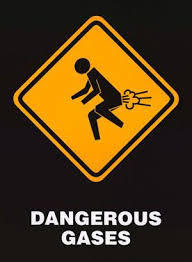Dr. Fart (Dr. Michael D. Levitt) speaks
 Everything you want to know about flatulence /Fart , and some things you don't.
Everything you want to know about flatulence /Fart , and some things you don't.
To understand the nuances of farting, or flatulence, I called upon Dr. Michael D. Levitt, a gastroenterologist and associate chief of staff at the Minneapolis Veterans Affairs Medical Center. Levitt, 64, could well be called Dr. Fart because he is the world's leading authority on flatulence. He has had 275 articles printed on flatulence in medical journals, as either the principal author or the co-author.
Levitt works with four assistants out of a small laboratory on the third floor of the V.A. hospital, about a mile west of the Mississippi River. almost always a man whose wife has prompted her husband to find out why he cuts the cheese so often.
To clear the air (there will be no more puns in this story), Levitt says that his research has shown that on average the normal number of flatulatic occurrences a day is 10. There are scores more, but they are all internal explosions and since this gas technically never leaves the body, it can't really be considered flatulence.
Levitt notes that if you have on average more than 22 separate flatulent occurrences a day, then you may want to consider several things: what you eat, how fast you eat it and how much air you swallow when you eat or drink.
In his 40-year career, Levitt has seen only two patients (both men) who farted upward of 140 times a day, but these extraordinary cases were lactose-intolerant individuals and, once dairy products were cut out of their diets, they returned to the normal range of acceptability. "These two were the biggest farters of my career. One of them complained that his sex life had been ruined by his chronic farting," Levitt says.
There are four possible reasons why some people fart more than others: They eat a lot of carbohydrates; they swallow air when they eat; the bacteria in their intestines are more efficient in turning carbohydrates into gas; or, conversely, the bacteria in their intestines don't consume carbohydrates efficiently, and therefore produce gas. -product of hydrogen sulfide gas—the same stench that emanates from rotten eggs.
The biggest gas-generating ingredients are sugars, especially the following four:
· Fructose – A natural ingredient in plants like onions, corn, wheat and even pears. It's often concentrated into a sugary syrup for soft drinks and fruit drinks.
· Lactose – Milk's sweet natural ingredient, also added to foods like bread and cereal. Some people areborn with low levels of lactase, the enzyme that breaks down lactose, a fact that inflates their gassy susceptibility.
· Raffinose – The secret gassy ingredient in beans, which is also found in broccoli, cauliflower, cabbage, asparagus and other vegetables. Products like Beano, designed to reduce gas production, break down the sugar before it can reach eager intestinal bacteria.
· Sorbitol – Found in almost all fruits, this indigestible sugar is also used as an artificial sweetener in "diet" and sugar-free foods. Yes, sugar-free gum, candy, soda and anything else deceptively sweet can cause gas.
Out is important. While Levitt says he has never treated someone who held a fart in too long, there are dangerous side effects (including dizziness and headaches). Your colon becomes bloated, and theoretically, the methane and other lethal gases could add enough toxins to your blood to poison you. Levitt does not recommend holding in farts.
Besides beans, vegetables (especially broccoli, brussels sprouts, cabbage and cauliflower) are also gas producers, as are grains and fiber. (Pumpernickel, the dark-grain bread, means "goblin that breaks wind" in Old German.) In fact, some of the healthiest foods, touted as anodynes for cancer and heart disease, are the foods that produce the most gas.
But what if you don't eat lots of veggies and carbs and you still exceed 10 explosions a day on the fart-o-meter scale that Levitt says is normal? There could be several reasons:
Drinking too many carbonated beverages. The fizz in most carbonated beverages comes from carbon dioxide, which is dissipated by the time it reaches your intestines. But many soft drinks contain fructose, a sugar the intestines have a difficult time absorbing, thereby causing flatus, the medical term for farts (which comes from the Latin meaning "the act of blowing").
Drinking through a straw. If you sip air when you swallow, then the air has to come out some way, often through your butt.
Eating too fast, and eating too much fast food. Chew your food slowly. The act of eating quickly tends to induce the diner to take in air, thereby bloating the colon, as well as turning the air inside deadly.
Chewing gum. When you chew gum, you swallow air, and that means more of the above.
Not enough exercise. Exercising helps the body absorb gases in the colon, thereby dissipating them by the time they reach your anus.
Speaking of silent but deadly, Levitt doubts their existence. "Noisy farts can smell just as bad as silent ones," he says. "That's another myth that needs to be put to rest."
Whether silent or musical, all farts are made up of a variety of gases. The majority are made up of nitrogen, oxygen, carbon dioxide, hydrogen and methane -- all odorless. As anyone who has been to summer camp knows, methane, even in small amounts, can torch a match. The higher density of methane, the greater the bluish-green flames. The hydrogen in farts can cause a loud popping sound when ignited. Fart smells come in when sulfur gets stirred into the gaseous mix. Hydrogen causes the fart to waft quickly upward.
how do we make them go away? Levitt says that over-the-counter items like Bean-O and Gas-Ex rarely work. Antacids work on some people, but Levitt stresses that for the best results, users should take no more than four tablespoons or tablets a day.
For odor, about the only thing that Levitt says works is a fart cushion made of charcoal, called the Tooter Trapper, invented by a man whose co-workers complained of his farts so much that they demanded he be moved out of the office pool into a separate room with a door. The air filter, which you sit on, does a good job of eliminating fart odors but, of course, treats only the results, not the symptoms, of the noxious-smelling gas.
And as for masking the sound, Levitt says that depending on the anatomical peculiarities of a person's anus, sounds can vary when gas is squeezed through such a tight opening. The larger the volume of gas expelled and the greater the pressure exerted, generally the greater the noise, although Levitt says that standing usually tends to minimize the sound over sitting, which can amplify the toot.



No comments:
Post a Comment